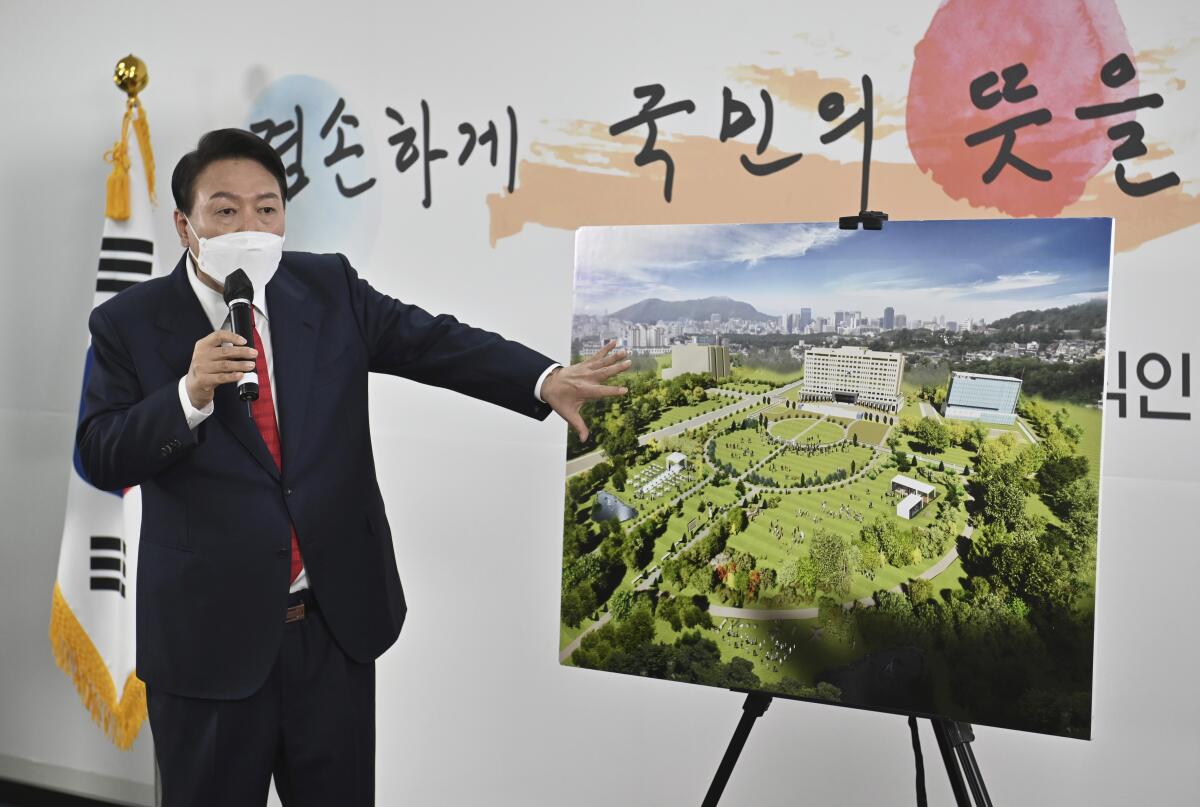South Korea’s Yoon faces obstacles in plan to ditch Blue House

- Share via
SEOUL, South Korea — South Korea’s outgoing liberal government expressed its opposition Monday to a plan by its rival and conservative President-elect Yoon Suk Yeol to relocate the presidential office by his inauguration in May, a development that could put Yoon’s ambitious project in doubt and trigger a domestic political firestorm.
On Sunday, Yoon said he would abandon the current mountainside presidential palace of Blue House and begin his five-year term at a new office established at the Defense Ministry compound in Seoul on May 10. Yoon said his plan requires Defense Ministry staff to move to the nearby Joint Chiefs of Staff building at the compound and JCS staff to move in phases to somewhere else in Seoul.
Yoon said his relocation plans are meant to better communicate with the public, saying the location and design of the Blue House have contributed to South Korean leaders being cut off from the public and wielding “imperial power.”
But his announcement quickly invited criticism that a hasty relocation of top security-related offices would weaken South Korea’s national security, cause a confusion in state affairs and inconvenience the public. Critics of his plan urge him not to rush the relocation, saying he faces many other urgent tasks such as how to revive pandemic-hit livelihoods, resolve deepening economic inequality and runaway housing prices, and ease North Korean nuclear threats.
The presidential office of departing President Moon Jae-in said it held a national security council meeting Monday to discuss Yoon’s plan.
After the meeting, senior presidential official Park Soo-hyun said council members determined Yoon’s relocation schedule is too tight and that it would be more appropriate to move such top offices after sufficient preparations. Park said it’s necessary to look at concerns that “abrupt” and “unprepared” relocations could cause “a security vacuum and chaos” at a time when North Korea raises animosities with missile tests.
Park said Moon’s government would relay its position to Yoon’s power transition team.
Moon government officials have noted the North’s recent burst of missile tests and planned springtime military exercises between Seoul and Washington, which Pyongyang calls an invasion rehearsal.
To realize his relocation plan, Yoon would need Moon’s support as the current government must formulate a budget to pay for the cost of the moves. Yoon said the relocation would cost about 50 billion won or about $41 million.
Kim Eun-hye, a spokesperson for Yoon, expressed regret over the Moon government’s statement. She said Yoon will keep his promise to return the Blue House to the public on his inauguration day and begin his term at the transition office.
Separately, Yoon’s People Power Party reportedly requested Moon’s government to allocate the necessary budget immediately. Some observers say if Moon’s government refuses to accept its demand, a severe political wrangling between the rivals will likely occur.
The Blue House is where all South Korean presidents have lived and worked since the country’s foundation in 1948. At the massive Blue House compound, offices for presidential advisers and the press room are not in the same building where the president works and are hundreds of yards apart. Some former officials said they sometimes used bicycles or cars to visit the president.
Moon had also earlier attempted to move out of the Blue House but scrapped the plan after failing to find a site for a new office. Park said participants of Monday’s security council meeting agreed on Yoon’s cause for the relocation.
Yoon said he chose the Defense Ministry compound as a site for the country’s new presidential office because it’s already equipped with security-related command facilities. He said he aims to build a White House-style office by allowing ordinary citizens to come close to his office building and look at it over a fence and establishing a press center at the same building.
Yoon won the March 9 election by narrowly defeating his main liberal rival Lee Jae-myung. South Korea’s constitution limits a president to a single five-year term, so Moon was barred by law from seeking a reelection.
More to Read
Sign up for Essential California
The most important California stories and recommendations in your inbox every morning.
You may occasionally receive promotional content from the Los Angeles Times.










